February 27, 2025
Business
Branding
Marketing
Time to Read:
4 Minutes
Author:
Trevann Thompson

The ability to adapt and innovate continuously is crucial for business success. Stagnation can be the death knell for businesses that fail to evolve with the times. A recent study emphasizes the importance of adopting a responsive business innovation model to stay competitive and create ongoing value. This article explores why continuous innovation is essential and highlights effective strategies for refining and adapting business models, particularly digital transformation.
Continuous innovation doesn’t end at creating new products or services. Your entire business model should be constantly evolving to stay relevant. Businesses that do not innovate risk falling behind their competitors, losing market share, and ultimately becoming obsolete. In a world where customer preferences, technology, and market conditions are constantly changing, maintaining the status quo is not an option. Companies must be agile and ready to pivot when necessary to meet new challenges and seize emerging opportunities.
Digital transformation builds a strong foundation for continuous business innovation. It involves integrating digital technologies into all business areas, fundamentally changing how you operate and deliver value to customers. Following this process means rethinking old operating models, experimenting more, and becoming more agile and responsive.
One of the most significant benefits of digital transformation when it comes to supporting innovation is the ability to leverage data analytics. By collecting and analyzing data, businesses can gain insights into customer behavior, market trends, and operational efficiency. These insights enable companies to make informed decisions, personalize customer experiences, and identify areas for improvement. For example, predictive analytics can help anticipate market changes and adjust strategies proactively, ensuring brands remain ahead of the curve.
Artificial intelligence (AI) and automation are powerful tools for driving innovation. AI can enhance decision-making processes by providing deeper insights and automating routine tasks, freeing human resources for more strategic activities. Automation improves efficiency and accuracy, reducing costs and increasing productivity. For instance, chatbots can handle customer inquiries 24/7, providing immediate responses and improving customer satisfaction. Implementing AI-driven systems in supply chain management can optimize operations, reduce errors, and improve overall performance.
Digital transformation allows businesses to enhance customer experience significantly. By using digital channels, companies can provide more personalized and seamless interactions. For example, implementing an omnichannel strategy ensures that customers receive a consistent experience whether they are shopping online, on a mobile app, or in a physical store. Personalization technologies, such as recommendation engines, can offer tailored suggestions to customers, increasing engagement and loyalty. Additionally, leveraging social media and other digital platforms can improve customer communication and feedback, allowing businesses to respond quickly to customer needs and preferences.
In addition to digital transformation, brands must focus on continuous refinement and adaptation of their models to create ongoing value. This involves regularly evaluating and adjusting strategies, processes, and offerings to align with evolving market demands.
Embracing agile working is essential to fostering a culture of continuous innovation. Agile practices like design thinking emphasize iterative development, collaboration, and flexibility. By breaking projects into smaller, more manageable tasks and continuously testing and refining them, businesses can respond quickly to changes and deliver value to customers faster. Agile teams work closely with stakeholders, ensuring that feedback is incorporated at every stage, leading to better outcomes and higher customer satisfaction.
A customer-centric approach requires businesses to prioritize understanding and meeting customer needs and preferences. This involves gathering customer feedback, conducting market research, and staying attuned to industry trends. By placing customers at the center of decision-making, companies can develop products and services tailored to their target audience. This approach also fosters loyalty and advocacy, as customers feel valued and understood.
Collaboration is a key driver of continuous innovation. Businesses should actively seek partnerships and collaborations with other organizations, startups, and even competitors. These partnerships can bring fresh perspectives, new ideas, and access to different resources and expertise. Collaborative innovation allows companies to explore new markets, develop innovative solutions, and stay ahead of industry trends. By fostering a culture of openness and collaboration, businesses can tap into a broader pool of knowledge and drive innovation more effectively.
In this era of rapid change and technological advancements, standing still is the quickest way to fall behind. Integrating digital technologies and prioritizing continuous innovation is your ticket to marketing and communication greatness. Data analytics helps brands truly understand their customers and craft personalized campaigns that hit home. Embracing AI and automation to streamline these operations elevates customer interactions and supports faster, smarter responses. Consistent, seamless experiences across all platforms translate to loyal, engaged customers who keep coming back. A customer-centric mindset ensures you're always in tune with what your audience wants, keeping your offerings fresh and relevant. By continuously refining your approach and embracing digital transformation, you'll stay ahead, create lasting value, and forge stronger connections with your customers.
Ready to seize opportunities for growth and success? Contact ONWRD today, and let’s get started.


February 3, 2026
Marketing
Strategy
Branding

January 20, 2026
Marketing
Comms
Strategy